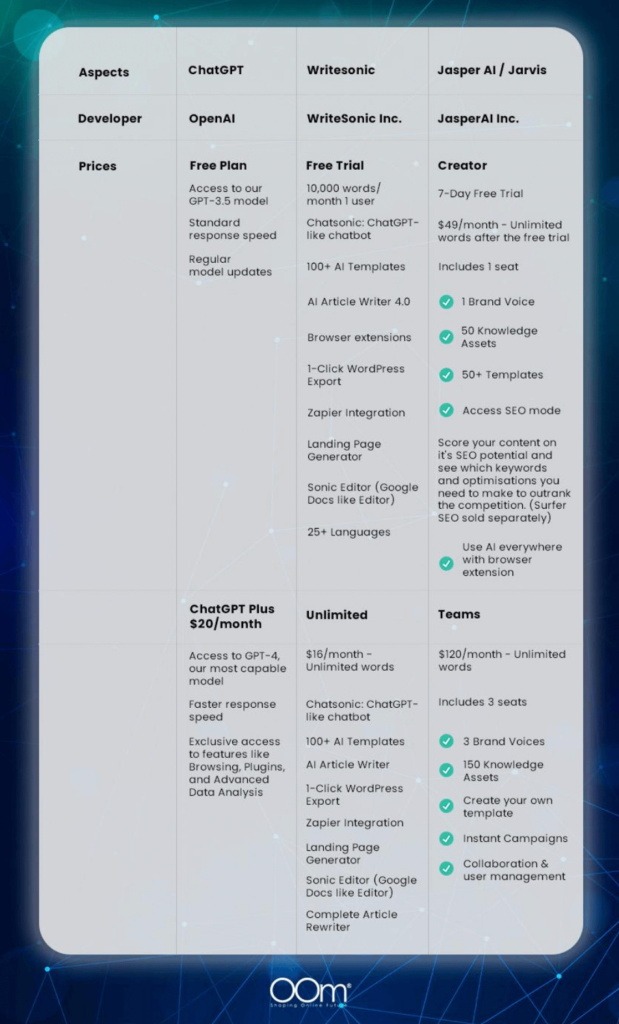
AI in Content Marketing: Strategies For Brands
Before ChatGPT became a hot topic, the term ‘artificial intelligence’, mostly known as AI, was coined in 1956 and has been around for decades. AI’s rapid application, evolution, and expansion in many industries have transformed how people live and work, including the content marketing industry.
Many businesses have included AI in their content marketing strategies to improve their promotional campaigns and get their message across to their target audience. Some other companies have doubts about including AI due to various reasons, such as 1) quality and creativity concerns, 2) bias and ethical issues, and 3) loss of authenticity.
If you also have doubts, you should know that these are not necessarily reasons to reject AI in content creation altogether. With proper use of AI, you can do quality control with proper interventions, which is crucial for responsible AI integration in content creation.
Incorporating AI into content marketing requires careful consideration. To help you decide, below are the best AI content marketing strategies brands and other businesses can take note of and follow.
6 AI Content Marketing Strategies For Brands
Identify Business Goals
Given that AI has many uses, you should start to understand and identify your business’s goals. Doing so should help you determine how AI would enhance your content marketing efforts. Remember that you can use AI for personalisation, SEO, data analytics and customer support.
Select the Right AI Tools
Once you have identified your goal for including AI, you should weigh your options and choose the right AI tool that can increase your business’s efficiency and productivity. Here is a brief comparison of the AI tools that you can use for content creation:

Data Collection and Management
AI thrives on data, making data collection and management a critical component of AI content marketing. Brands should gather relevant data from various sources, including customer interactions, website analytics, and social media insights.
Proper data management ensures that AI algorithms have access to high-quality and relevant information to drive content personalisation and decision-making.
Content Personalisation
Even though AI tools help ease the process of content creation, businesses should not forget personalisation to keep the engagement going. For brands to deliver content tailored to their target audience, they should ensure that the generated content contains the right voice, tone, writing style and other elements that represent them. Personalised content can help improve customers’ experiences, leading to higher conversion rates and customer loyalty.
Quality Control
Incorporating AI in content marketing does not end with copying generated content to publishing the materials online. A human intervention is necessary to guarantee that the quality is consistent across all forms of generated content.
Human writers need to read, review, and check the generated content to fact-check information and align it with the brand’s voice and values. In other words, they will become editors who will address any potential issues that may arise from automated content.
AI Detectors
Besides fact-checking and proofreading, human writers should consider the human content score. It is a metric that determines if the generated content sounds like an actual person and not a robot.
Writers can use specialised AI detector tools to pinpoint areas that need improvement, from readability to engagement and delivery. Nevertheless, writers should not only focus on getting a higher human content score based on the tools’ judgement, but instead critique a content’s quality for the intended readers. Use the detector as a guide instead of a primary basis for your content output.
Remember that the only purpose of using AI detectors is to determine whether or not the generated content is well-structured, organised, has proper flow, and is grammatically correct. The most important aspect of content is its ability to connect with readers and contain helpful and relevant information.
Plagiarism Checkers
While it is true that Google does not go against AI content, businesses should be mindful of their usage of AI in their content marketing. After all, Google penalises plagiarised work.
Use a plagiarism checker like Duplichecker to scan your content and identify what parts were considered plagiarised from published content throughout the web. It has a dashboard allowing you to compare and contrast highlighted texts flagged as “plagiarised”. The results let human writers easily find and edit parts to increase the uniqueness of the overall generated content.
Continuous Monitoring and Evaluation
Once you publish generated content on your website, guarantee that you continuously monitor its traffic. Like original content, you will also need to update generated content from time to time to increase its relevance to your target audience.
Conclusion
AI is no longer a futuristic concept; it is a powerful tool that brands and other companies worldwide can harness to enhance their content marketing strategies. Businesses can stay competitive in the digital marketplace by leveraging AI for personalization, SEO, data analytics, and customer support.
As the world of AI continues to evolve, companies that embrace these technologies can position themselves to engage their target audience, drive conversions, and achieve long-term success in the dynamic world of content marketing.
Contact OOm, an award-winning digital marketing agency in Singapore, if you need help improving content marketing campaigns to attract more customers and make conversions.



















